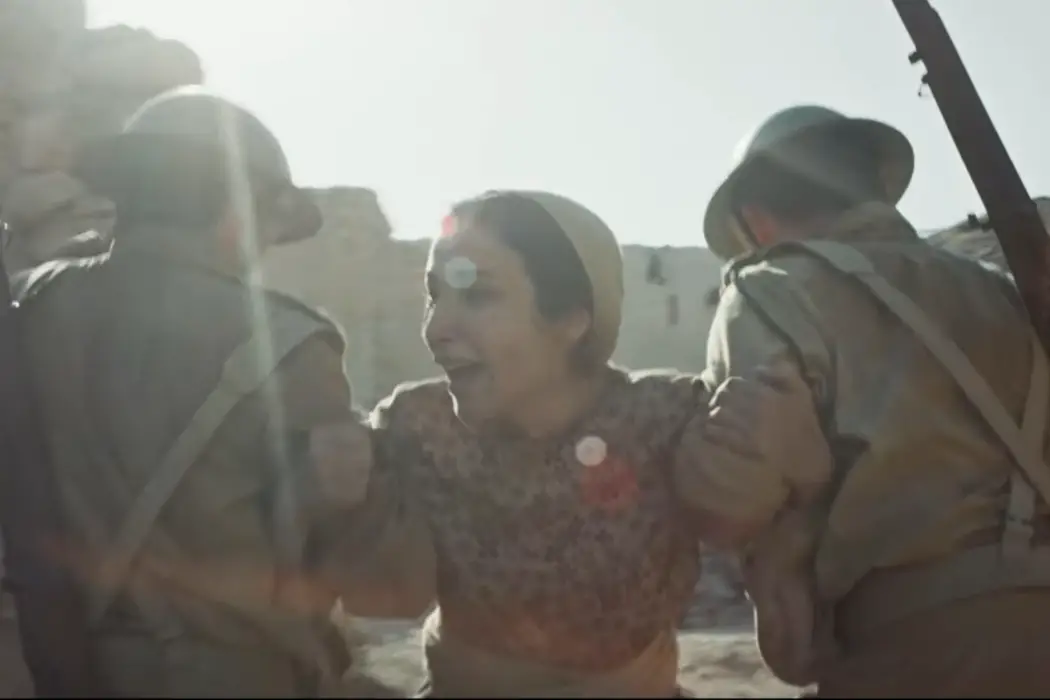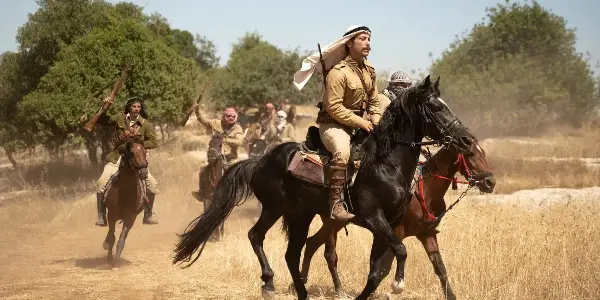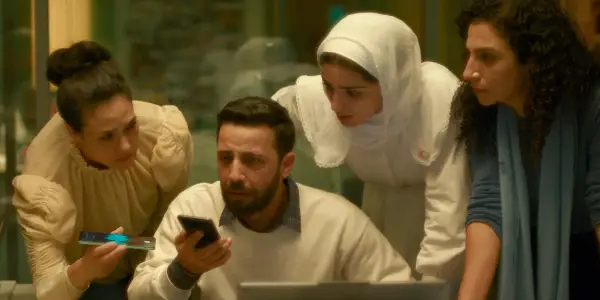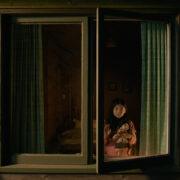TIFF 2025: PALESTINE 36, SINK and THE VOICE OF HIND RAJAB

I'm a film journalist and independent filmmaker who fell in…
One of the more noticeable themes at this year’s Toronto International Film Festival was the emphasis on narratives that honor each artist’s heritage. The need for individual voices in a world where certain perspectives and truths are being chastised, repressed and silenced. As someone of Middle Eastern heritage, I am honored and proud to have witnessed a great acceptance and empathy for Arab-centric cinema at the festival’s 50th anniversary. It’s truly a momentous occasion, and three films I saw this year — Palestine 36, Sink, and The Voice of Hind Rajab — reflect the sense of liberation and mature sensibilities that the best of MENA cinema can offer. Emotional rollercoasters and films of ideas, for sure. More importantly, however, they are an urgent call to action in what are truly devastating times.
PALESTINE 36

When Annemarie Jacir (along with her cast and crew) received an extended, heartfelt standing ovation for the world premiere of Palestine 36, it was indeed a revolutionary moment for MENA (Middle East and North Africa) and SWANA (Southwest Asia and North Africa) cinema. A sign of the changing times where the voices of the colonised and oppressed were finally being heard.
The film’s plot revolves around the events surrounding the 1936 revolt (one of the many early forms of resistance in the occupied land), where ordinary villagers and city-based intellectuals rose up against the British Mandate that made way for Zionist rule in Palestine.
Jacir has never hesitated to confront the troubles in her homeland, from those displaced by war in the thought-provoking 2012 film When I Saw You to the internal conflict that lies within Palestinian families in the political (yet witty) Wajib in 2017. With Palestine 36, Jacir constructs an immaculate, multi-stranded epic showcasing one of the earliest forms of resistance to apartheid, settler colonialism, and Western imperialism in 20th-century Palestine. This picture is more akin to (and kind of references) the liberating film The Battle of Algiers than it is to the white-savior narrative of Lawrence of Arabia.
The film’s great ensemble cast brings a lot of pathos to their characters, showcasing a range of plights. Some, like dock worker Khalid (Saleh Bakri), leave their day jobs to physically fight off British rule, while others like the journalist Kholoud (Yasmine Al Massri) utilize intellectual strategies to protect their people (it also throws in a nice dose of gender politics into the mix, considering she is patronized by the British). In addition to fending off against aggressive British officials, there is the more complex situation of having to deal with those fearful of imperialistic punishment, who end up enabling Zionist control and influence.
These ideas make a big difference, especially when you take into consideration that this isn’t just a film about the past; this film was made to confront the demons and monsters we face today. It also asks you to look at how history is written by the occupiers, and how revolutionaries can be marked as insurgents — or terrorists.
There are more than a few violent scenes, and even grim moments where villagers find themselves having to bury those who were martyred at gunpoint. Defying fear, the Palestinians in this film may not win every battle, but they are resilient enough that they spit in the face of the Balfour Declaration.
A rich tapestry, Palestine 36 also boasts cinematography that mixes eternal mythical imagery and sweeping vistas with intimate character portraits set against the backdrop of the marvellous production design. Ben Frost‘s score infuses the film with an undercurrent of sorrow while maintaining a sense of optimism.
Jacir cleverly incorporates colorized archival footage of 1930s Palestine, showing beautifully constructed forts, bustling street markets and a great many individuals going about their daily lives. These historical inserts amplify the timelessness of Palestinian culture and identity, while also emphasising the humanity of its people, even when the British officials forcefully reduce these citizens to a herd-like entity of helplessness and subservience.
It’s great films like Palestine 36 that perfectly illustrate why rebellions are born and urge us to research our own history rather than rely on false narratives.
SINK

There’s a Lynchian scene in Sink where Nadia (Clara Khoury) is awoken in her bedroom by her mentally disturbed son, Basil (Mohammed Nizar). Her husband and other kids aren’t around to witness the surreal “dance” that follows, but it isn’t some bizarre ritual. It’s a plea for help; a way for Basil to communicate with his mother, the only person who hasn’t given up on him.
That is just one of the many nuggets found in Zain Duraie‘s confident and powerful feature film debut.
The narrative sees a nervous Basil have an altercation with his teacher (after attempting to give a presentation) and finds himself expelled from his school in Jordan. What really happened almost feels like a Rashomon situation, but Nadia fights off the system (whom she’s always blamed for making Basil feel unsafe) and those that choose to make Basil a pariah. In the meantime, an insular Basil becomes more withdrawn from his family and from society, and Nadia’s loyalty to him is tested as his psychological state devolves into something more primal.
Basil’s mental health condition is never explicitly stated, and we don’t know how long he’s been enduring this condition. However, he seems afraid of getting psychiatric help. It raises many questions, especially as to who (or what) got him to this stage.
Like in Lynne Ramsay‘s We Need To Talk About Kevin, Duraie doesn’t sensationalise mental illness and always treats the potential “Jekyll & Hyde” symptoms (which one may experience in reality) as matter-of-fact. The scenes showcasing Basil’s strange behaviour are always given careful attention under Duraie‘s sensitive guidance and through the brilliant and watchful lens of cinematographer Farouk Laâridh.
Wherever her experience and research with this subject matter stems from, it’s clear that Duraie loves her characters and wants to see them get better and succeed. Nizar is excellent in the role, mixing sadness and threat with humour and personality, while always maintaining Basil’s plight in clear focus. Khoury brings so much humanity and nuance to her already-complex role, and gets to convey a playful nature in her doting mother role.
Consider a scene where Nadia and Basil have a night out in town (while the rest of the family is away). They have a great dinner and go dancing with a random assortment of strangers. It’s all fun and games… until it isn’t. Basil unwittingly broadcasts his private pain, frightening Nadia. It is that moment that defines the conflict in Duraie‘s intricate portrait. Nadia is a great parent, but she’s only human after all. We as an audience can’t blame her for her mixed emotions, but still want her to care for Basil.
Laâridh‘s camerawork utilises a variety of closeups, mediums and over-the-shoulders, keeping a good measure of intimacy and emphasising haunting expressions and stares. The wide shots almost tease something otherworldly, especially in one instance when Basil wanders out of the house in an atmospheric static shot.
Sink excels in all manner of technical proficiency (from the editing to the production design), but special mention has to go Israel Bañuelos‘ sound design. From the teasing opening titles to various points that exhibit heavy breathing and disorientation, sound design becomes a character in its own right. It teases the darker side of the picture while also tapping into the headspace of our protagonists.
Like her fellow thespians, Khoury and Nizar, Duraie‘s strongest asset as a filmmaker is her fearlessness. She is unafraid to venture into truly uncomfortable territory, and her actors perform bizarre scenes with the utmost respect for the material. It is refreshing to see a grown-up film of this nature to feel liberated both stylistically and thematically.
While the landscape may be changing, the stigma around mental health remains prevalent, especially in the Middle East. Sink invites the audience to challenge and question the society around us and ask us to empathise with those of us who mirror the protagonists and their struggles.
I initially thought Sink was a psychological drama, but that wouldn’t be entirely accurate. This is a story of a complicated bond between a mother and son, and, on a metafictional level, an artist like Duraie‘s love for our flawed humanity.
Deeply personal and thankfully lacking in any form of cynicism, Sink is a cinematic gem that reminds us that hope can shine brightest even in the darkest of times.
The Voice Of Hind Rajab

After the Israeli invasion of Gaza (which began in October 2023), thousands of Palestinian civilians were killed by Israeli militants.
The Voice of Hind Rajab takes a harsh but honest look at one such incident on January 29, 2024, where a 5-year old girl was murdered by the Israeli Defence Forces while she was trapped in a car (let that sink in). Taking place almost entirely within the confines of a single location, the film dramatizes the real-life event and centres on a group of coordinators and volunteers from the Palestine Red Crescent Society who try to jump through many legal and militaristic hoops in order to secure the rescue of the poor child.
The film is relentlessly brutal in its portrayal of the trials and tribulations of our heroes, who work tirelessly to save civilians around Gaza from afar. Each of the four primary players has their own approach and philosophy in handling the situation.
Two of the volunteers, Omar (Motaz Malhees) and Rana (Saja Kilani), are most closely aligned as far as endurance and maintaining a measure of calm and control as they try to assure the frightened child on the other end of the line. Nisreen (Clara Khoury) is the group’s therapist and active listener. She tries to remain diplomatic but offers a maternal, nurturing touch as best she can, given the dire circumstances.
Finally, there’s Mahdi (Amer Hlehel), who is responsible for coordinating the rescue missions and operations. In many ways, his job is the most stressful; he’s always under a lot of pressure to deliver with so little time, and still has to sort out the logistical nightmares that come with the territory. Contacting the Gaza Health Ministry and the Israeli military to ensure a safe route for the ambulance drivers to reach those in peril is not an easy task. Being a stickler to the rules can often put Mahdi at odds with his colleagues, especially Omar, who’s reached his limit.
They’re all human, and are all within their rights to be angry, frustrated and miserable, especially as even more grim details surrounding Hind’s rescue are revealed. It’s a complex situation for them, as they’re all well-intentioned but have different takes on the risks involved.
Brilliantly directed and carefully written by Kaouther Ben Hania, the film smartly incorporates archive footage of the real Red Crescent workers portrayed in the film and audio files, which feature the recorded conversations between the dispatchers and Hind Rajab. This docudrama approach not only allows us to become immediately involved with horrible predicament, but forces us to reassess our humanity and question the bias, favoritism, and prejudices and prejudiced in our world, past and present. It’s also a grim reminder that as we’re watching this, many civilians (and their rescuers) are at risk of being killed.
There’s a hell of a lot that this film has to say. It goes without saying that it’s anti-occupation and anti-war, but it also questions the idea of justice. Why do Arab and Palestinian lives matter less than those of Israelis? Why are we just numbers and statistics rather than identifiable human beings with aspirations, dreams and fears? And why are ambulance drivers being fired upon by tanks and machine guns when they’re trying to save innocent lives?
Especially in part to the great acting from all the performers involved, The Voice of Hind Rajab is a cinematic masterwork. It implores us to take action and stand up to the oppressive forces that try to silence us or keep us in willful ignorance.
Follow our coverage of TIFF 2025 here!
Does content like this matter to you?
Become a Member and support film journalism. Unlock access to all of Film Inquiry`s great articles. Join a community of like-minded readers who are passionate about cinema - get access to our private members Network, give back to independent filmmakers, and more.
I'm a film journalist and independent filmmaker who fell in love with cinema at a young age. I also love writing about comics, literature, podcasts, television and video games. I'm just as content watching a movie about a giant killer pig terrorising the Australian outback as I am with one that features a catholic priest in crisis.













